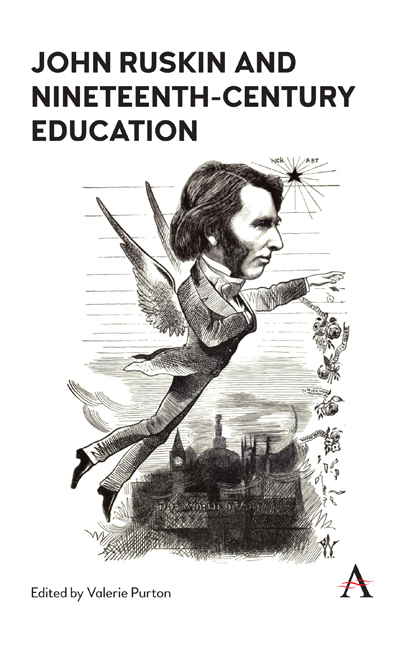Book contents
- Frontmatter
- Contents
- List of Figures
- Foreword
- Introduction
- Section A Changing the World
- Section B Libraries and the Arts
- Chapter 5 ‘A Very Precious Book’: Ruskin's Exegesis of the Psalms in Rock Honeycomb and Fors Clavigera
- Chapter 6 ‘Our Household Catalogue of Reference’: Ruskin's Lesson Photographs of 1875-76
- Chapter 7 Ruskin, Music and the Health of the Nation
- Chapter 8 Ruskin and the Fantastic
- Section C Christianity and Apocalypse
- Notes on Contributors
- Index
Chapter 5 - ‘A Very Precious Book’: Ruskin's Exegesis of the Psalms in Rock Honeycomb and Fors Clavigera
from Section B - Libraries and the Arts
Published online by Cambridge University Press: 25 July 2018
- Frontmatter
- Contents
- List of Figures
- Foreword
- Introduction
- Section A Changing the World
- Section B Libraries and the Arts
- Chapter 5 ‘A Very Precious Book’: Ruskin's Exegesis of the Psalms in Rock Honeycomb and Fors Clavigera
- Chapter 6 ‘Our Household Catalogue of Reference’: Ruskin's Lesson Photographs of 1875-76
- Chapter 7 Ruskin, Music and the Health of the Nation
- Chapter 8 Ruskin and the Fantastic
- Section C Christianity and Apocalypse
- Notes on Contributors
- Index
Summary
The work of Ruskin's that focuses most clearly on books, on how to read, on what to read and how books should be disseminated is Sesame and Lilies (1865). The first of the three Sesame lectures, ‘Of Kings’ Treasuries’, concerns a project for the institution of public libraries that was finally to materialize ten years later in Bibliotheca Pastorum, one of the many collective and educational enterprises undertaken for the Guild of St George. In this chapter I will examine Ruskin's edition of the four classic volumes that comprise his ‘Shepherds’ Library’, concentrating particularly on Rock Honeycomb, an edition of a selection from the Sidney Psalter, and placing it within the context of his long- term interest in the Book of Psalms as a whole. Of the Holy Books, the Psalms, in which the Word is specifically and uniquely both a collective and a personal form of prayer, was a ‘very precious book’ for Ruskin. It repeatedly served him during the 1870s, a decade during which he was meditating on and testing his views on language, on poetry, on art and on man's wider spiritual search. I shall focus especially on his ideas on translation as a development of a hermeneutic approach he had practised in Sesame, as a means of bringing life to a text. I shall subsequently refer to some Fors Clavigera letters of the same years, where his method of reading the Psalms in depth is applied also to human experience and to his own life, and sense is clarified through a process of expansion that provokes searching reflection. Ruskin's massive and constant reference to the Bible and his application of Scripture to contemporary life have been recently explored by Zoe Bennett, who convincingly classes Ruskin as one of the leading ‘Practical Theologians’. Bennett's perspective is particularly relevant to my reading of Ruskin's role for the Psalms in Fors Clavigera, as it is in these public letter– sermons that, in my view, these connections are most systematically and most innovatively made.
The Shepherds’ Library Project
Bibliotheca Pastorum is a collection of four books that Ruskin edited and published between 1876 and 1888.
- Type
- Chapter
- Information
- John Ruskin and Nineteenth-Century Education , pp. 83 - 100Publisher: Anthem PressPrint publication year: 2018

